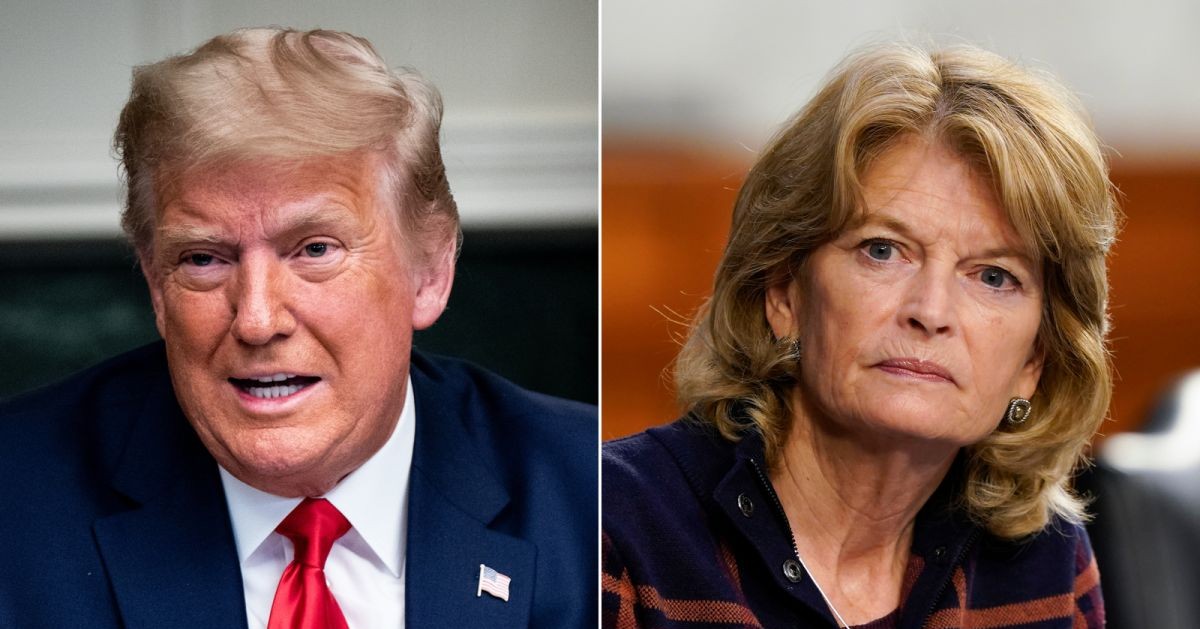OPINION: This article may contain commentary which reflects the author's opinion.
A race for the U.S. Senate that has yet to be called got much closer after a batch of absentee and early ballots were counted on Wednesday. According to the Washington Examiner, incumbent GOP Sen. Lisa Murkowski dramatically gained on Trump-backed Kelly Tskibaka, pulling to within 600 votes, or around .03 percent, and putting her on pace to narrowly win a fourth term.
Former President Donald Trump, who declared his intention to run for the Republican presidential nomination on Tuesday, backed Tskibaka over Murkowski after the incumbent voted to impeach him following the Jan. 6 Capitol Building riot.
The outlet reported:
Murkowski is considered to be one of the more centrist Republican voices in Congress, and her win could help President Joe Biden pass his agenda as well as extend her clout in the Senate, where Democrats hold a slim majority. Even though the path to a win for Tshibaka has been all but blocked, her campaign adviser Mary Ann Pruitt claimed the new vote totals were “an ominous sign” for Murkowski “to be trailing at all at this stage of tabulations,” the Anchorage Daily News reported.
Neither Murkowski nor Tshibaka is expected to reach the 50% threshold needed for an outright win, which means the race will come down to a ranked-choice tabulation.
Tshibaka Maintains Narrow Lead over Murkowski, Palin Trails Democrat https://t.co/yZXkIweVTV via @BreitbartNews
— Vanessa O'Deplorable (@vanessaodom) November 17, 2022
Earlier this month, NBC News reported that Tshibaka received 44.3 percent, besting Murkowski’s 42.8 percent, with around 75 percent of the vote counted by the Thursday after Tuesday’s elections.
“In Alaska’s Senate race, Republican Sen. Lisa Murkowski has faced a serious challenge from fellow Republican Kelly Tshibaka. Because no candidate on the ballot will reach 50%, the contest now proceeds to a ranked-choice runoff as per the state’s rules. While the seat will be won by a Republican, the ranked-choice voting process will determine the winner,” the outlet reported.
Kelly Tshibaka still fighting strong against the RINO that is Lisa Murkowski ✊🏻 pic.twitter.com/nz7LNseqgS
— UK Neil (@UKNeil4) November 9, 2022
Under the ranked-choice system, rather than picking a single candidate for office, Alaska voters this year were allowed to rank the candidates in their order of preference. In the first round of voting, if no one reaches the 50 percent threshold, then the election goes to a second round, which begins with the candidate who received the fewest number of votes being eliminated from consideration. If that candidate was a voter’s first choice, then the vote goes to their next choice in the second round. The process continues until one candidate is ultimately declared the winner.
The system has been heavily criticized by Republicans in the state, including former Gov. Sarah Palin, who said the system favors Democrats or candidates like Murkowski, who she said otherwise could not win the election outright.
“This is what’s going to elect Democrats and destroy our country before we even know it,” she told Breitbart News last month ahead of the election. “I am just sounding that alarm that it’s this bad.”
Palin ran for Alaska’s lone House seat which had been in Republican hands for decades until Rep. Don Young died suddenly earlier this year. In a ranked-choice special election, a Democrat — Mary Peltola — won the seat. Last week, she also won a majority of the votes after Palin and fellow Republican Nick Begich split the GOP vote nearly in half. Together, they received more than 50 percent of the GOP vote, but because no one in the race got more than that, it, too, will go to a ranked-choice runoff with Begich already eliminated.
“I don’t want this to happen to any other electorate, in any city, in any state,” the former governor said. “Alaska is kind of this test case right now where we have elements of a perfect bad storm. We have lax voter-ID laws. We have a long election cycle where mail-in ballots can be mailed in for — gosh — it seems like months, if not many weeks.”
“Those are just a couple of aspects that create kind of this distrust of people in the process, and we cannot afford to have people not trust free and fair elections in our communities, in our states, in our nation, or we’re going to go under,” she said.
“It’s not winner-take-all,” the former governor said. “You rank the candidates. … Then a process of elimination via an algorithm in a computer takes votes and distributes it to other candidates if the person that you did choose as your number-one pick didn’t end up on top.”
